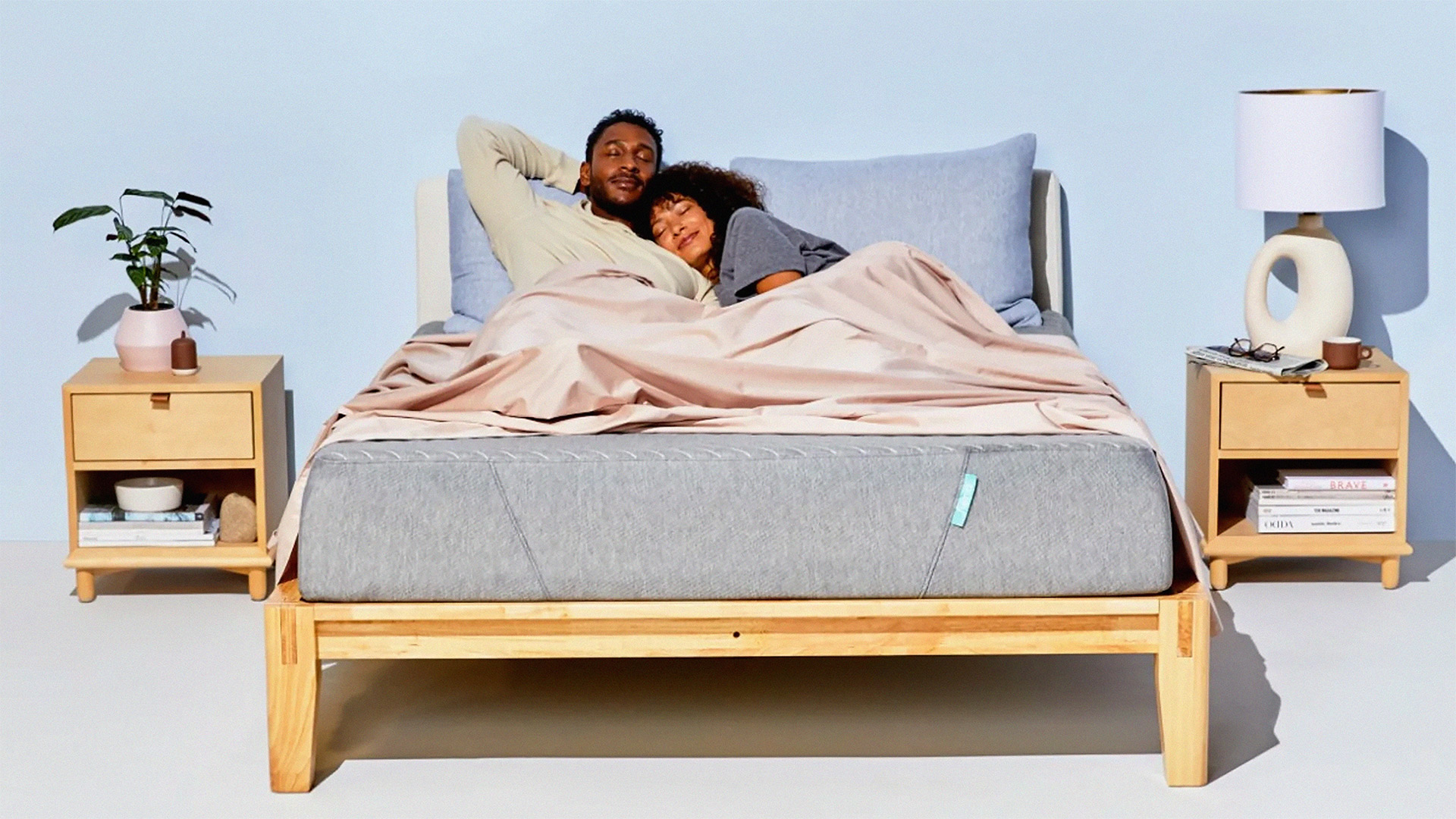TechRadar Verdict
The Siena mattress boasts a 5-layer construction and comes with a generous 180-night trial – all for an extremely budget-friendly price. It's a steal for front and back sleepers who love a firm and supportive feel, although side sleepers might prefer a softer touch.
Pros
- +
Low price – high quality build
- +
Back & front sleeper friendly
- +
Superb motion isolation
- +
Excellent edge support
Cons
- -
Firm, with minimal contouring
- -
Won't appeal to all side sleepers
Why you can trust TechRadar
Siena mattress review: Two-minute review
The Siena Memory Foam Mattress made quite the entrance in March 2022 with a markdown from its already-low MSRP. It's remained on sale ever since, and sits solidly in budget mattress territory – but based on my hands-on experience, I believe the Siena is not only the best cheap mattresses on the market right now, but also holds its own against some of the best mattresses with heftier price tags.
I slept on a twin Siena mattress for three weeks, and had a diverse group of five testers nap on it, as well. My full review is below, complete with all of the details. But if you're pressed for time, here's the abridged version...
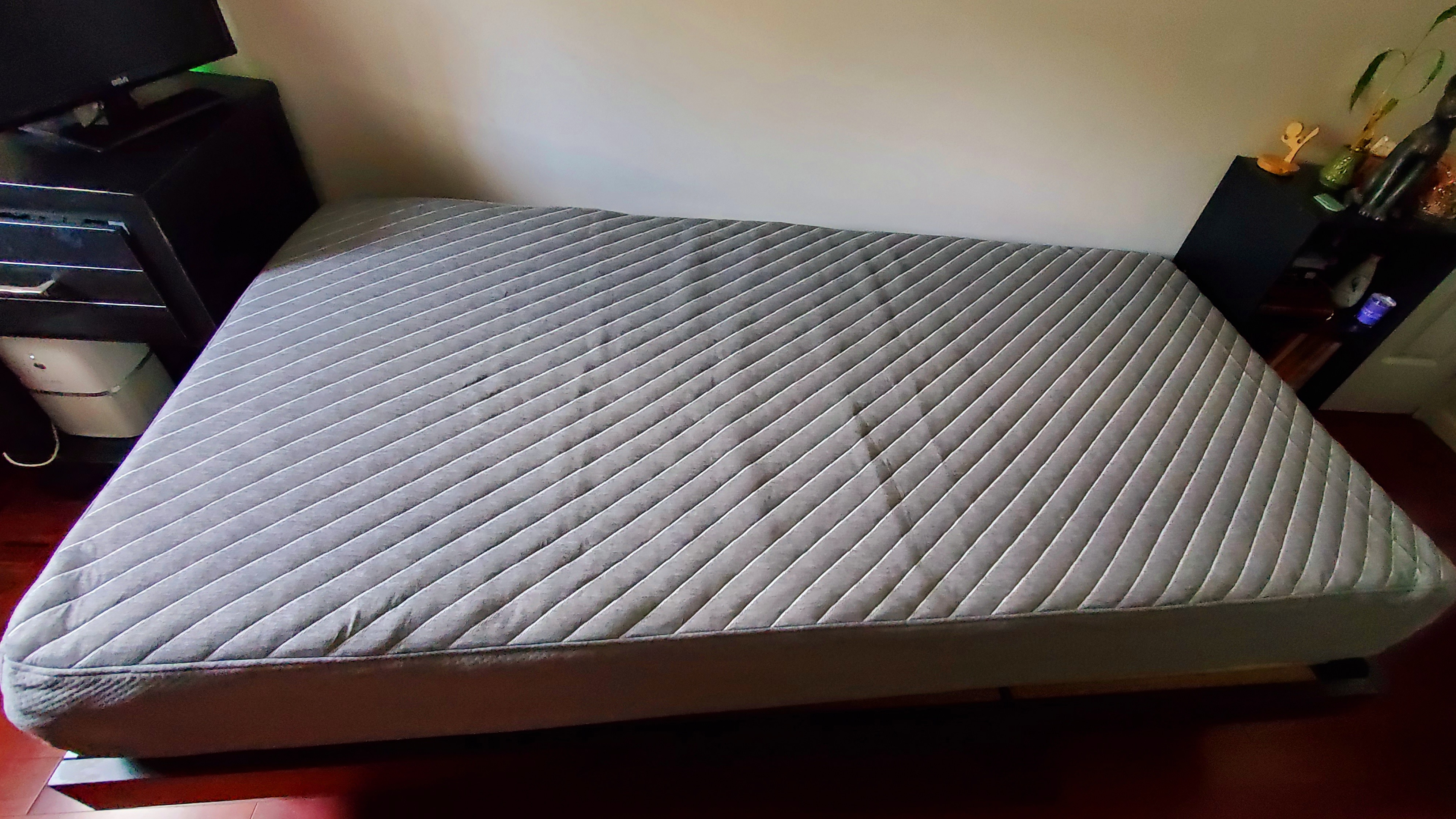
The 10-inch Siena features three foam layers, capped with a polyester top cover and a shift-resistant bottom cover. This diverges from the single- and dual-layer construction typically found among budget memory foam mattresses. Since my initial review, the Siena has had a minor redesign: the base layer is shorter, the comfort layer has increased in height, and the top memory foam layer is half an inch smaller. Plus, the top polyester cover no longer has polyethylene fibers to aid with moisture-wicking. The core materials, however, remain the same.
Despite these modifications, I think the Siena will maintain its overall level of performance, and may even have a more balanced feel. Although Siena's self-assessment is a 6.5 out of 10 on the firmness scale, my fellow testers and I found the Siena much firmer than that, collectively rating it a 9 out of 10 (in fact, it's the firmest option in TechRadar's best firm mattress guide). Thus, the Siena will likely resonate with front and back sleepers who want the support of a sturdy mattress with minimal give. Dedicated side sleepers might grapple with its unyielding surface, and those with joint pain might yearn for deeper pressure relief.
Surprisingly, the Siena was a welcome reprieve from one of the hottest summers on record. Its cooling prowess exceeded expectations and should be suitable for most sleepers; although those who excessively overheat may need something more specialized. Meanwhile, the Siena's excellent motion isolation makes it a sound choice for couples, and I can personally vouch for its stable edges as someone who relied on them for support during recovery from a back injury.
In terms of value, the Siena is a gem. It comes with a 180-night trial – that's half a year to try it out at home, a rarity for mattresses in this price bracket. (It's backed by a 10-year warranty, too).
Siena mattress review: materials & design
- A 10-inch mattress with three foam layers
- Minor change in design since its release in 2022
- Polyester cover isn't removable
The Siena has undergone a minor facelift since I originally tested it in September 2022. Originally, the Siena featured a 5.5-inch polyfoam base layer (for stability), two inches of rippled transitional foam (for cushioning and improved airflow), and a 2.5-inch layer of gel-infused memory foam (for cooling and contouring).
Today, the Siena's base polyfoam layer and support foam layer each measure four inches, while the top gel-infused memory foam layer is now two inches. These tweaks may give the Siena a more balanced bed feel than I experienced a year ago.
The top cover is still made of soft polyester, though the polyethylene weave (for moisture-wicking) appears to be missing now. (The shift-resistant bottom cover is also polyester.) The cover isn't removable so you'll certainly want to invest in one of the best mattress protectors to shield it from spills and stains.
Design changes aside, the Siena still boasts one of the most complex builds I've seen from a cheap memory foam mattress. With a total of five layers, it's similar in build to its mid-range sibling, the Nectar. (For the lowdown on that, read our Nectar Mattress review.)
- Design score: 4 out of 5
Siena mattress review: price & value for money
Since it entered the market in March 2022, the Siena has never sold at its suggested retail price. At launch, it was already $200 off. That discount eventually increased to $300, bringing the price of a queen to a mere $399.
Regardless, the Siena is quite a steal for a five-layer memory foam mattress. That value becomes even sweeter with the inclusion of a 180-night trial period – generous for a budget bed. There's also a 10-year warranty, which is comfortably within the industry average. While the Siena doesn’t come bundled with freebies, shoppers do have the chance to add a bedding bundle at a bargain price of $99 (a $499 value).
- Value for money score: 5 out of 5
Siena mattress review: comfort & support
- Officially rated medium-firm but many find it much firmer
- Excellent support for front and back sleeping
- Lack of 'hug' may deter side sleepers and those with back pain
In August 2022, I spent a whole month sleeping on a twin Siena mattress. I'm a 5ft 4, 140lb side/front sleeper with a nagging lower back injury. However, I couldn't be the only one to try it out so I asked five other adults to sleep on the Siena to help me gauge its performance across a spectrum of body types and sleep needs.
Siena rates its memory foam mattress at a 6.5 out of 10 on the firmness scale (medium-firm). My panel and I felt much differently as we unanimously determined it was a much firmer bed. Collectively, we rated it a 9 out of 10 on the firmness scale. Of course, with the recent tweaks in Siena’s foam layer structure, there's a possibility it now skews softer, but if the most recent customer reviews are to be believed, plenty of sleepers still find it decidedly firm.
The side and back sleepers among us said the Siena struck a nice balance of comfort and support, providing just enough give along our joints and lower backs. As someone who occasionally sleeps on their stomach, I found the Siena kept me well-aligned.
However, as a dominant side sleeper, I needed a week to properly break in the Siena. It was initially too rigid along my hips and shoulders (the best mattresses for side sleepers tend to be a bit softer). I eventually settled into it and (fortunately) didn't have any pain. That wasn't the case for one of the back sleepers in my group. At 5ft7in and 210lbs, he found the Siena too unyielding, and he ultimately developed a lower backache after a few moments of resting on it.
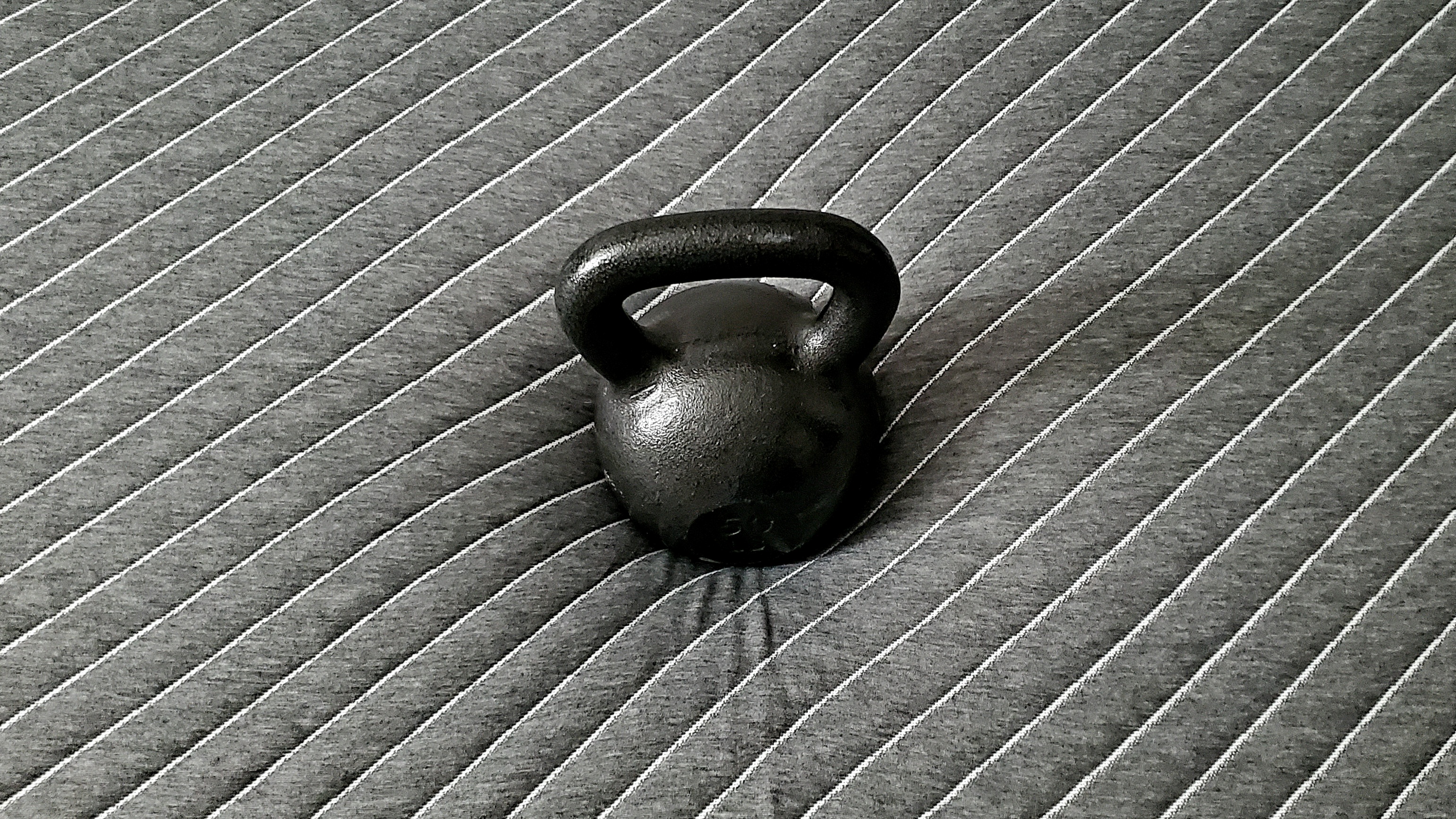
To objectively test the Siena's pressure relief, I placed a 50lb kettlebell in the middle of the mattress. The weight sank roughly an inch into the surface, which immediately snapped back to form once I removed the weight. That matches what we human testers experienced.
So who will like the Siena? It seems to be a match for back and stomach sleepers who prefer firmer support. Side sleepers might also enjoy it if they don't like anything too plush but overall I’m hesitant to recommend it exclusively for side sleeping – nor would I consider it an ideal mattress for back pain since there's not much pressure relief.
Again, the latest design changes could theoretically offer a more nuanced feel, but recent customer feedback suggests that many still find the Siena firmer than anticipated. For a softer mattress at a similar price, consider the Allswell mattress. During our Allswell mattress review, we found it had a medium feel that was good for back and stomach sleepers. You can see how it compares with the Siena in our Siena vs Allswell mattress showdown.
Siena mattress review: Performance
- Sleeps cooler than expected
- Edges are stable all around
- Minimal motion transfer
During my month with the Siena mattress, I performed a series of tests to evaluate its temperature regulation, motion isolation, and edge support – all according to TechRadar's mattress methodology. Here are the results...
Temperature regulation
I slept on the Siena in August, which was the perfect chance for me to test the efficacy of its cooling materials. It includes a layer of rippled comfort foam to improve airflow and a gel-infused memory foam to help dissipate heat.
Despite my tendency to occasionally overheat, I didn't wake up sweaty once with the Siena. Whether I dressed the mattress in 100% cotton sheets or a cotton-polyester blend, I remained comfortably cool beneath my mid-weight polyester comforter.
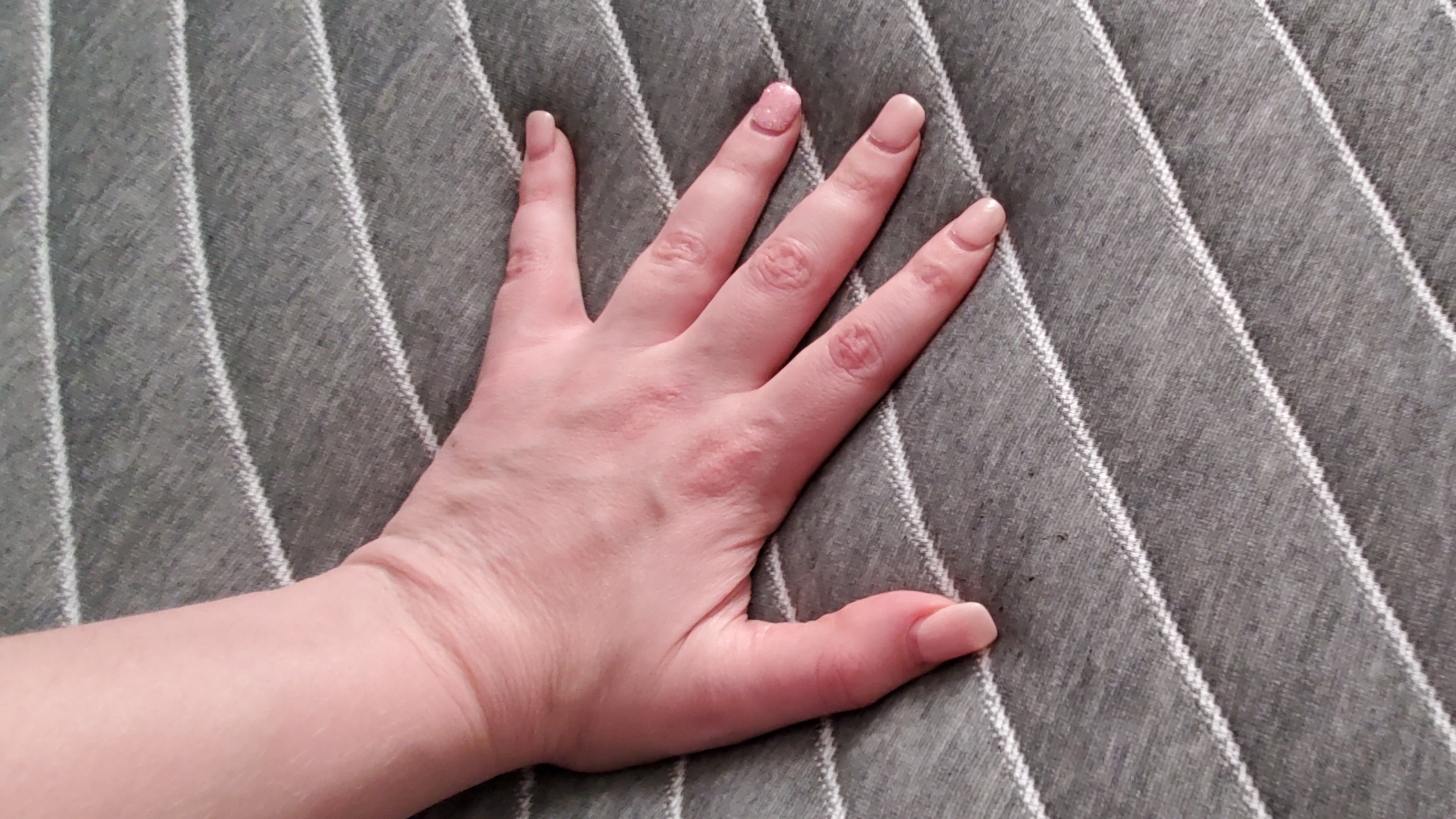
The Siena’s firmness potentially helps with its temperature control. Memory foam mattresses are prone to trapping heat with their enveloping sink. Instead, my fellow testers and I felt like we were slightly hovering right above the surface of the Siena, mitigating the potential for overheating.
The Siena mattress will keep most sleepers at a comfortable temperature. However, chronically hot sleepers should consider a specialized cooling mattress crafted with innovative materials designed to ward off night sweats and hot flashes.
(Note: The original Siena included polyethylene fibers woven into the cover for moisture-wicking. Although this appears to have been phased out, I doubt its absence will dramatically compromise the Siena’s temperature regulation.)
- Temperature regulation score: 4 out of 5
Motion isolation
To test the motion isolation on my twin Siena mattress, I conducted a series of drop tests using a 10-pound weight and an empty wine glass. I positioned the weight 25 inches from the wine glass and dropped it from three distinct heights: four inches (to simulate tossing and turning(, eight inches (to simulate someone climbing in or out of bed), and 12 inches (to simulate the impact of jumping in or out of bed).
The wine glass remained virtually motionless throughout each drop, and the weight had a slight bounce before coming to rest on the surface. This suggests that the Siena mattress has superb motion isolation, making it a great choice for anyone sharing a bed with a restless partner or an enthusiastic pet.
- Motion isolation score: 4.5 out of 5
Edge support
At the time of testing, I was recovering from another flare-up of my back injury, which meant I had to sit on the side of the bed before standing up. Luckily, the Siena has superb edge support, which made my morning wake-ups much less painful. The rest of my review panel said they felt secure when seated on the corner or along the side. Minimal compression made it easy to push up.
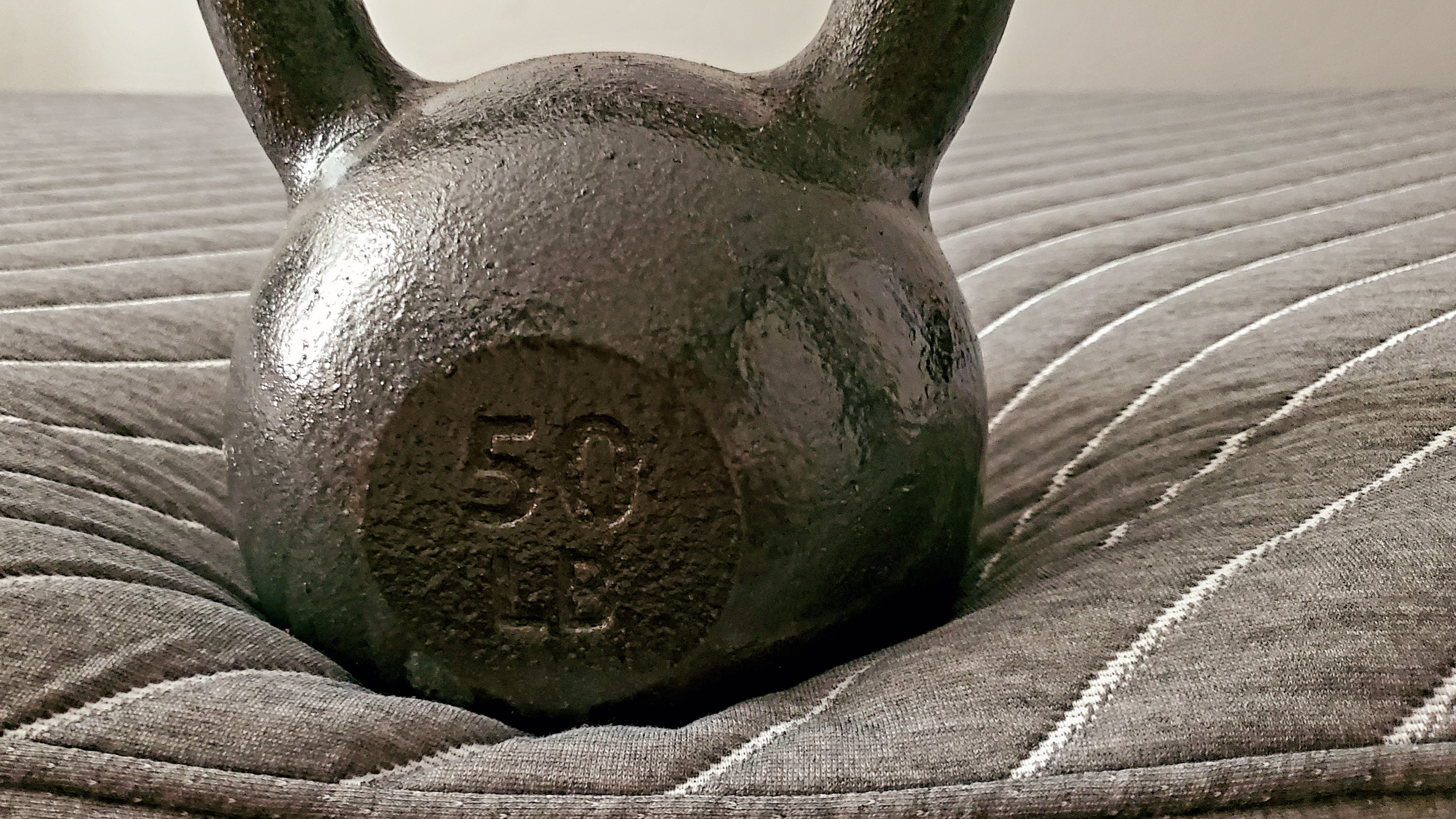
For an objective look, I placed a 50lb weight along the perimeter. It compressed about an inch, the same measurement I recorded when testing the pressure relief in the center of the bed. The edges shouldn't dip lower than the middle, so the Siena aces this portion of the test.
Conclusion: if you intend to use every inch of your sleep surface, you'll be well-supported by the Siena – whether you sleep in a twin (like I do) or something larger.
- Edge support score: 5 out of 5
Should you buy the Siena mattress
Buy it if…
✅ You're a back or front sprawler: With its firm feel and stable edges, the Siena is inviting for front and back sleepers who like to stretch out comfortably.
✅ You share a bed with an active partner: The Siena's top-notch motion isolation bodes well if you want to sleep uninterrupted amidst your partner's flopping.
✅ You're on a strict budget: At $399 for a queen, the Siena is one of the most affordable mattresses out there. The six-month trial is a nice bonus, too.
Don't buy it if…
❌ You're a dedicated side sleeper: Side sleepers who want a mattress that molds to their body may find the Siena too stiff. Our roundup of the best mattresses for side sleepers can point you in a cushier direction.
❌ You crave a traditional memory foam feel: Those in pursuit of a body-hugging foam mattress will find the Siena lacking. Consider its mid-priced sibling, the Nectar mattress, for a more typical memory foam experience.
❌ You deal with severe overheating: While the Siena slept surprisingly cool for me, it may not suffice for chronically hot sleepers. For an all-foam bed tailored for cooler slumber, check out our Cocoon by Sealy Chill mattress review.
How I tested the Siena mattress
I slept on a twin Siena Memory Foam Mattress for four weeks in August 2022. During that time, I was running my central air as we were in the midst of some dreadfully hot weather. I dressed the mattress in either 100% cotton or cotton/polyester bed sheets, with a mid-weight polyester comforter on top.
I'm a 5-foot-4 side/stomach sleeper who at the time weighed 140lbs and was struggling with yet another flare-up of my lower back pain. To supplement my experience, I had five other adults nap on the Siena for at least 15 minutes in their usual positions and sit along the edge. Testers ranged in size from 5-foot-4 and 126lbs to 6-foot and 215lbs.
To objectively gauge the Siena's performance, I conducted a series of standardized tests. I used a 50lb weight to evaluate pressure relief and edge support, and a 10lb weight plus an empty wine glass to observe the motion isolation.
Alison is a freelance writer and editor from Philadelphia, USA. She is an expert mattress tester and sleep product reviewer, and has been sharing trusted buying advice and retail news for over a decade. When she isn't reviewing mattresses or hunting for deals, Alison can be found teaching/training in martial arts, fawning over skincare, and indulging in her quarantine-borne hobby: cooking.
